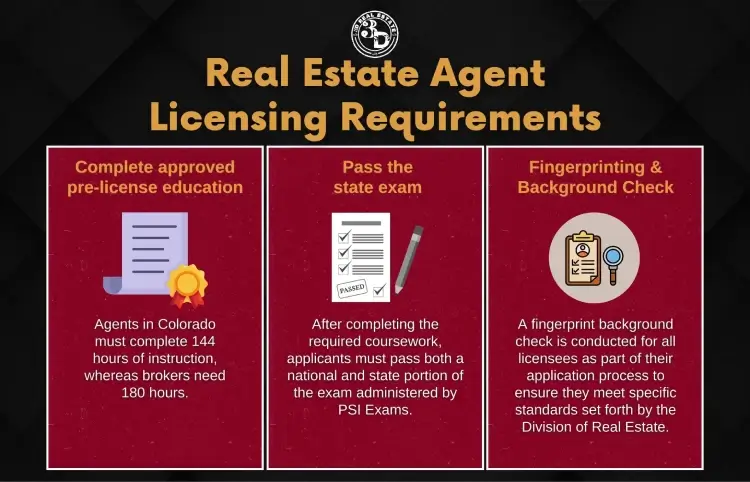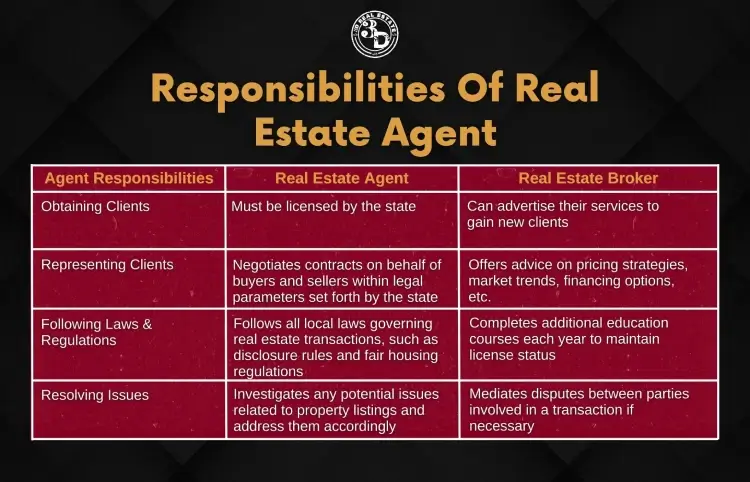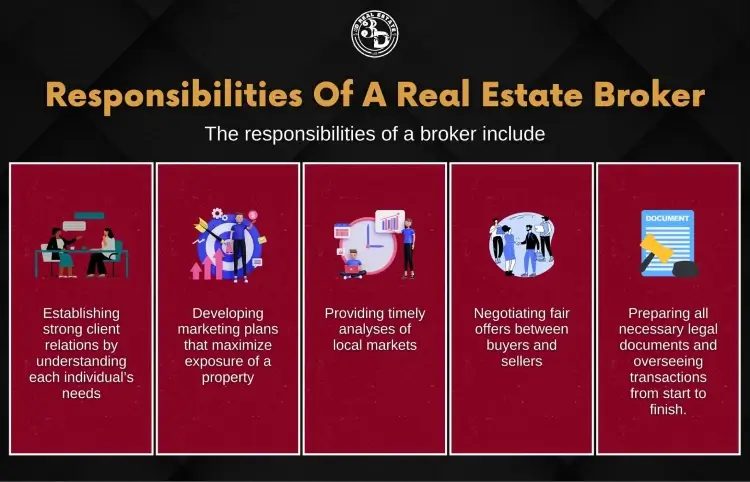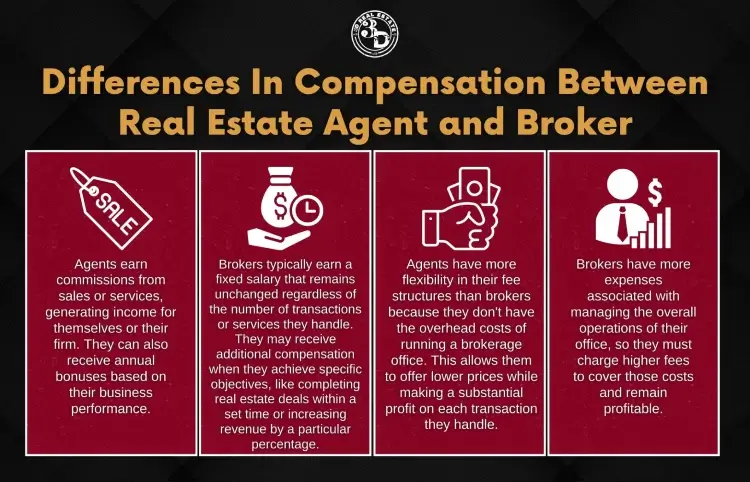Are you planning on becoming a real estate agent or broker in Colorado? Do you want to know the main difference between an Agent and Broker in this state? In this article, I’m going to discuss the variations between agents and brokers in Colorado as well as the requirements for each position.
With our extensive experience in the real estate industry, I’m here to share lessons I’ve learned that, ideally, will help anyone wishing to join or deepen their involvement in Colorado’s thriving real estate community. Let’s dive further into the details of what sets Agents and Brokers apart!
Overview Of The Roles
The roles of an agent and broker in Colorado are different, yet they share some common responsibilities. When buying or selling real estate, agents and brokers operate as middlemen between buyers and sellers. They must be familiar with local laws, regulations, and market trends and have a working knowledge of applicable contracts.

However, the two functions that will be covered here have clear distinctions from one another.
- An agent is often employed by a registered real estate broker who acts on behalf of the buyer or seller for whom the transaction is being done. Agents need to follow the standards set forth by their employing broker when dealing with clients or other agents from outside firms. In Colorado, agents must provide full disclosure about property listings and obtain any necessary approvals before entering into an agreement with either party involved in the transaction.
- A broker has more experience than an agent does; therefore they can legally represent both parties in a transaction without involving another broker or agent from outside sources. Brokers also generally oversee many aspects of transactions such as negotiations, contracts, inspections, and closings. Brokers may manage multiple properties on behalf of owners which requires them to keep up-to-date records regarding taxes, rents, leases, and maintenance costs associated with each property.
As well as having knowledge in these areas they should understand real estate financing options too so they can offer advice if needed during a deal process. It’s important to know the differences between agents and brokers because this state requires special licensing requirements for each role. Understanding these distinctions will help ensure that all parties involved receive appropriate legal representation throughout their real estate transaction.
Licensing Requirements
In Colorado, real estate agents and brokers must be licensed to perform any kind of real estate activities. Whether you’re an agent or a broker, here are the license requirements:

- Complete approved pre-license education – Agents in Colorado must complete 144 hours of instruction; whereas brokers need 180 hours.
- Pass the state exam – After completing the required coursework, applicants must pass both a national and state portion of the exam administered by PSI Exams.
- Fingerprinting & Background Check – A fingerprint background check is conducted for all licensees as part of their application process in order to ensure they meet certain standards set forth by the Division of Real Estate.
There’s only one major difference between agents and brokers regarding licensure. In addition to meeting all three criteria listed above, brokers also have to show proof that they’ve completed at least two years (4,000) hours as an active real estate licensee within five years prior to applying for their broker’s license – something not expected from agents.
Responsibilities of a Real Estate Agent

Now that we’ve discussed the licensing requirements for agents and brokers in Colorado, let’s take a look at the responsibilities of an agent. Agents have many duties to fulfill when working with clients who are buying or selling real estate. These responsibilities are outlined below in a 3-column and 4-row table.
| Agent Responsibilities | Real Estate Agent | Real Estate Broker |
| Obtaining Clients | Must be licensed by the state | Can advertise their services to gain new clients |
| Representing Clients | Negotiates contracts on behalf of buyers and sellers within legal parameters set forth by the state | Offers advice on pricing strategies, market trends, financing options, etc. |
| Following Laws & Regulations | Follows all local laws governing real estate transactions such as disclosure rules and fair housing regulations | Completes additional education courses each year to maintain license status |
| Resolving Issues | Investigates any potential issues related to property listings and addresses them accordingly | Mediates disputes between parties involved in a transaction if necessary |
As can be seen in this table, both agents and brokers must follow certain laws and regulations when representing clients in real estate transactions. Furthermore, they must obtain clients through either advertising (for brokers) or referrals (for agents). Finally, it is important for both roles to investigate any potential issues related to property listings and resolve any disputes that may arise during the process.
Responsibilities Of A Broker

A real estate broker’s role in Colorado is one of the defining factors of a successful real estate transaction. Brokers are responsible for providing clients with professional advice and tips on buying land in Colorado, selling, or leasing property. This includes helping to market properties, as well as ensuring that legal documents are properly prepared and executed. They also provide their clients with comprehensive market analysis and negotiation strategies throughout the entire process.
The responsibilities of a broker include:
- Establishing strong client relations by understanding each individual’s needs
- Developing marketing plans that maximize exposure of a property
- Providing timely analyses of local markets
- Negotiating fair offers between buyers and sellers
- Preparing all necessary legal documents and overseeing transactions from start to finish.
It is essential for brokers to be well-versed in the different aspects of the real estate business to effectively represent their client’s interests. Therefore, they must have an extensive background in Colorado real estate law and regulations as well as an understanding of current trends in the industry. Brokers should possess excellent interpersonal skills that enable them to build trust among their clients and provide exceptional customer service throughout the entire transaction.
Differences In Compensation
The differences between an agent and a broker in Colorado go beyond just the licensing requirements. One of the most notable distinctions is their compensation structure. Agents are typically paid on commission, while brokers receive both salary and fees for services rendered.

- Agents’ commissions come from sales transactions or from other services they provide as part of their job duties which generate income for them or their firm. They may also receive bonuses based on how much business they bring in annually.
- Brokers, however, usually receive a fixed salary that does not vary with the number of transactions completed or services provided. Aside from their base pay, brokers often get extra money when certain goals are achieved such as completing real estate deals within a certain time frame or increasing revenue by a specific percentage rate.
- When it comes to fee structures, agents tend to be more flexible than brokers due to their lack of overhead costs associated with running a brokerage office. This means they can offer lower prices while still making a considerable profit off each transaction they conduct.
- Brokers have more expenses associated with managing the overall operations of their office so they must charge higher fees in order to cover those costs and remain profitable.
Overall, there are some significant differences when comparing agent and broker compensation in Colorado – primarily related to commission rates, salaries, and fees charged for services rendered. It’s important for potential clients to understand these nuances before engaging either type of professional for help buying or selling real estate property in the state.
Conclusion
The key difference between an agent and a broker in Colorado lies in their level of licensing and the scope of their authority. An agent is licensed to represent a broker in real estate transactions, while a broker is licensed to work independently and directly with clients.
While both agents and brokers can provide valuable services to clients in the real estate space, it’s important to understand the distinctions and choose the right professional for your needs. If you’re looking for a licensed and experienced real estate agent or broker in Colorado, consider contacting 3D Real Estate. Our team of professionals can help guide you through the complexities of buying or selling property and guarantee that your interests are protected in every transaction.
Whether it’s you’re first-time buying a house or being a seasoned investor, partnering with a qualified real estate professional can make all the difference in achieving your goals. So why wait? Contact us at 3D Real Estate today as you move towards a successful real estate career.




